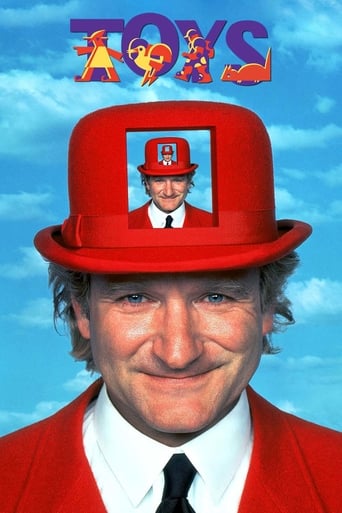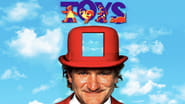gridoon2018
The production design of "Toys" is incredible. Ferdinando Scarfiotti creates a magical world that seems dissociated from time and space. If the script was at the same level this would be a great movie, but it's not. Robin Williams is ideally cast as the eternal child, but his ad-libbing is not as funny as, say, his voice work in the same year's "Alladin" (it's also eerie now to hear him making jokes about Michael Jackson, given both their fates). Joan Cusack gives a wonderful performance, and the final battle of the toys is pretty epic. On the other hand, a nearly 30-minute action climax kind of contradicts the movie's pacifist message. **1/2 out of 4.
terarex
This movie is fascinating, so creative. I don't want to review it or summarize it per se - it's excellent - but I wanted to point out how the conflict of the story is the militarization of "toys" to create remote controlled weapons. The toys that get made, or more correctly, intelligent drones predict in perhaps a satirical way on what has actually happened with modern warfare. Even how it appears like a "video game" in certain scenes.It's also very funny in what I call "smart-stupid" whereas the writing appears kind of dumb, but is actually very funny and well written in a dry way. I loved it as a kid for the war robots as I called them, I appreciate it more now.P.S. Who has sustained a similar level of fame for so long as LL Cool J???
billkincaid
It insults the intelligence of adult viewers with its preposterous mess of a story, yet has far too much sex and ultra-violence for more innocent young audiences. The ham-handed anti war message seems like a cheap way to try for credibility. It has so little wit, so little heart in its dull script, it seems like an amateur production, or perhaps something slapped together during a writers' strike. Yet it has some real talent both behind and in front of the cameras. Although one would hope for at least "so bad it's good" status to salvage some value from the rental cost, the many long, dry, humorless scenes make the two hours wasted on this mess at best regrettable. Apparently Barry Levinson leveraged his hit-making track record to get $43 million to make this utter bomb, scorned by audiences and critics alike. The studio execs were probably horrified when they screened it but not surprised when it failed to bring in $24 million in tickets before it slunk out of the theaters. If Barry Levinson had made this stinker before he made his box office successes, he would be working at Taco Bell right now.
nowarkfilmstudios
I saw 'Toys' at age 12 and again last night, now being 16. Before seeing it last night I tried to drum up all of my previous memories of this film. I recalled it being wildly colorful, creative and entertaining, and it held an important message. Upon a re-watch, I realized that I still identify with most of my earlier observations, but being older and more mature, with more knowledge in general, I came to appreciate something else the film had to offer. As far as the message goes, as a child it seemed so concrete. But now older I find it hard to pin down. But it has something to do with the inner child being extinguished by the quote-unquote "real world." Robin Williams is in this film. I loved him as a child, I found him funny and entertaining as well as serious when needed. His face drums up memories of Jumanji and Bicentennial Man. In this film plays the son of an eccentric toy factory owner. Where is this toy factory? The location is never established, and I believe that is intentional. Any scenery outside of the toy factory consists of rolling green fields that stretch all the way to the perfect blue sky, meeting at the horizon. The factory within is even more colorful, with bright blues, reds, whites and yellows that reminds us of childhood with its brightly colored plastic toys. Many of which are featured in this film, especially around the climax. We also see many cute, nonsensical things, such as toy ducks crossing a hallway while some characters sit and wait in their car. Why do they wait for the ducks to cross? What would it matter if the car simply ran over the lifeless, plastic ducks? Or for that matter, why do the characters dress so brightly with unnecessary flares and silly gimmicks? (ex: Robin Williams's character at one point is wearing a jacket that produces smoke, a "smoking jacket") Of course this leads one to the question, what's the purpose of aesthetics or art at all? Here the film makes a valid and pressing point. I came to realize that it is not in fact purposeless at all. The purpose is that the character wearing the "silly" outfit wants it that way. That is how he/she prefers it. The characters here live in a world without judgment and are free to express themselves. I have a feeling that if people were given unlimited resources and freedom from judgment, they would dress like this in a world like this. Then I came to realize this: this film, with its rolling green hills and perfect blue skies outside of the factory, and pure unprejudiced creation within the factory, takes place inside the mind. If you had to draw the interior of the mind, how would you draw it? Then when I realized that, everything else in the film seemed to match up nicely with human thoughts. The factory in 'Toys' is our idea of a perfect existence, being able to do whatever we wanted, free of judgment, having as much fun as possible and never growing up. This is childhood. But as the reader knows, childhood is not forever. Eventually we grow up and act not in interest of having fun as much as acting to avoid judgment or avoid bad judgment. We want to move along in unison with the rest of the people who had grown up to want the same thing. From out of this idea we get our villain, the uniformed general and brother to the original factory owner. He's what we'd call grown up and here to destroy everything childish and have the factory start producing war toys. This is our mind reaching what is called maturity. Society tells us that maturity is good, even though we can feel our inner child dying (which is also illustrated in the film, by showing a graphic toy war with flying plastic chunks and sparks). Nonetheless, the film then turns around and does something most people growing up do not do. The general, symbolizing maturity, is vanquished and the characters go on with their happy existence. Following my simile about the human mind, this part can seem confusing. But after deliberation, I concluded that the mind in the film had rid itself of the need to mature, and therefor was forever happy, free of judgment and free to express. I have a feeling that if this film was understood by more people in the way that I do, the message would be followed religiously and the film labeled as a holy scripture. It's why self-help books are so popular and for that matter, it is also why religions like Taoism, Buddhism and other beliefs that promise enlightenment are so popular. If you are a Taoist and you understand this film like I do, it would seem to be a work of art, an achievement of bliss and a goal to strive for. I give it a 9 out of 10. The only unnecessary part was discovering that (SPOILER::) the sister was a robot. There is really no point to this, but having said what I did earlier about things that seem pointless, I will not complain.




